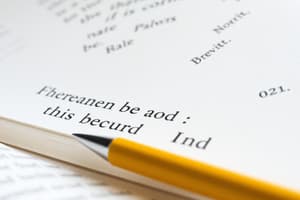Podcast
Questions and Answers
What is the primary purpose of making predictions while reading?
What is the primary purpose of making predictions while reading?
- To memorize the content
- To finish the book faster
- To identify spelling errors
- To increase comprehension and engagement (correct)
Which of the following is a feature that can help in making predictions before reading?
Which of the following is a feature that can help in making predictions before reading?
- The author's name
- The length of the book
- The illustrations or pictures on the cover (correct)
- The publication date
What should you do with your predictions after finishing the reading?
What should you do with your predictions after finishing the reading?
- Burn them as a reminder of mistakes
- Review them to see if they were accurate (correct)
- Forget them completely
- Record them for future reference
What might a well-written story do in relation to predictions?
What might a well-written story do in relation to predictions?
During which phase of reading can you make predictions?
During which phase of reading can you make predictions?
What is a synonym for the word 'synopsis' as mentioned in the context?
What is a synonym for the word 'synopsis' as mentioned in the context?
Why might a reader guess again after making an incorrect prediction?
Why might a reader guess again after making an incorrect prediction?
What might encourage a reader's excitement about a story before they start reading?
What might encourage a reader's excitement about a story before they start reading?
What is likely to happen when a reader's predictions are repeatedly incorrect?
What is likely to happen when a reader's predictions are repeatedly incorrect?
What is suggested about readers who practice making predictions?
What is suggested about readers who practice making predictions?
Flashcards
Making predictions
Making predictions
The ability to guess what will happen next in a story based on clues and prior knowledge.
Predictions before reading
Predictions before reading
Making guesses about a story before you even start reading.
Illustrations
Illustrations
Pictures on a book cover that give clues about the story's content.
Title
Title
Signup and view all the flashcards
Book description
Book description
Signup and view all the flashcards
Predictions while reading
Predictions while reading
Signup and view all the flashcards
Predictions after reading
Predictions after reading
Signup and view all the flashcards
Narrator
Narrator
Signup and view all the flashcards
Keeping you guessing
Keeping you guessing
Signup and view all the flashcards
Study Notes
Making Predictions
- Predictions are guesses about what will happen next in a story.
- Skilled readers make predictions before, during, and after reading.
Predictions Before Reading
- Illustrations/Pictures: Visuals on book covers can spark predictions about the story's content.
- Titles: Titles offer clues about the story's tone (e.g., funny, mysterious, happy, sad).
- Descriptions/Synopses: Summaries of a book can help predict plot points.
Predictions During and After Reading
- Active Thinking: Making predictions while reading keeps you engaged and improves understanding.
- Evaluating Predictions: Reflect on whether your predictions were accurate.
- If correct, consider what clues led to the prediction.
- If incorrect, understand why and try to make a new prediction.
- Author Skill: Difficult-to-predict stories highlight the author's skill in creating suspense.
Prediction Examples
- Example One: Tina and Tim likely will search for the tigers.
- Example Two: Sally's friend may give her a stuffed animal or Sally and her friend might visit Sally's house to retrieve it.
Studying That Suits You
Use AI to generate personalized quizzes and flashcards to suit your learning preferences.




